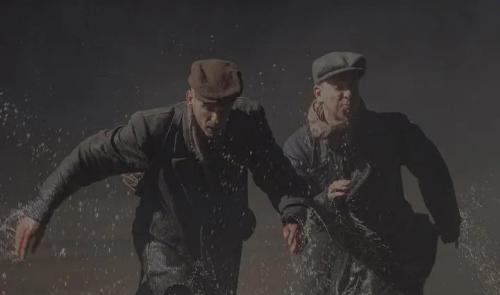Based on Alfred Wetzler's book Dante Didn't See, the Auschwitz Report follows the journey of two young Slovak Jews who fled Auschwitz and wrote a detailed report on how the death camp worked.

In the recent new hit, the Auschwitz Report is not highly praised, nor is it hot. Compared with the look and feel of commercial films, the historically significant Auschwitz Report seems to be unpopular.
The theme is very good, the singleness of narrative expression and the superficialization of the theme condensation make it difficult for the viewer to empathize, which is probably the main reason for its coldness.
There have been many catastrophic deaths in history, and literary and art workers have also reproduced the deep disasters in the history of human destiny in the form of documentaries, films, etc., and showed elegy, the Nanjing Massacre, Auschwitz concentration camp, the Chernobyl nuclear incident... Each one is as terrifying as a nightmare.
Auschwitz Report, Days of Two Fugitives.
The piles of naked corpses in the wooden houses, the smoke-filled crematoria chimneys, the exchange of food in the cold winter, the thinly dressed standing for several days and nights, the gas chambers, are all refractions of the ugly humanity of the Nazis.
Gray and cold environment, dead atmosphere. Undoubtedly, the film wants to pay tribute to the millions of Jews who were killed and to tell the world the truth. I also want to tell the world that history should never be forgotten, because that is the mistake of the predecessors, the sorrow of the innocent, and the alarm bell of modern people.
Perhaps, these can be left to the documentary, the film needs to present a wider and more extensible narrative space, unfortunately, the film still narrates the two people's escape process dragonfly, passing by, focusing on the historical conclusions of trying to expose and explore the Nazi crimes.
As ordinary people, most people do not know when this kind of disaster will come, let alone how to survive in the face of disaster, the Chinese people who tied their hands to the mass grave during the Nanjing Massacre, the Jewish refugees who went to the gas chambers in a numb way, sat and waited, waiting to be slaughtered, this is the most common human nature in the face of disaster.
The struggle between the two in the film is a good entry point, and human nature is the most difficult to grasp and the most real. However, these were ignored by the director.
In 1938, the infamous Munich Agreement partitioned Czechoslovakia, which became a logistics base and arsenal for German fascism. In 1940, Germany established Auschwitz in Poland, and in 1942, Heinrich determined the final Jewish solution at the Wansee Conference, and the organized and planned genocide began to be implemented.
The film is based in 1944. At this time, the two escaped from the concentration camp in Poland occupied by the German army, and fled back to the Czech Republic, still under German occupation.
The world was unaware of Germany's heinous crimes in the concentration camps, and it was not until the eve of victory in 1945, when the Red Army and the Allies discovered the concentration camps full of corpses, that the Nazi crimes were disseminated throughout the world by images of war correspondents.
The film simply explains that the identities of the two are prisoner scribes, what year did they enter the concentration camp? How to recognize? How to survive? How do I plan to escape? Why would other prisoners who practice consecutive sittings help them? How did they know to collect materials to take out? Who can they tell against the backdrop of nazi clouds hanging over the world and the fall of their homeland? Who would believe that? Poland was a foreign country to them, their homeland had fallen, and how was their planned escape route determined?
Perhaps the audience would prefer to see these details rather than some historical conclusive things, but in fact, in 1944, ordinary Czechs and the Red Cross could not do anything at all, and it was rare to survive the preservation of good evidence. However, the director wants to benchmark "Schindler's List" and visualize the heroes who saved the world and save mankind, and it is really difficult to empathize after watching it.
To this day, we still remember the horrors of the Nazi concentration camps and the Nanjing Massacre, but it is too difficult to shoot this kind of subject matter well- to avoid sensationalism, face up to the pain of history and the heinous crimes of executioners, avoid social risks and polarization of group emotions, and let people have more thinking about the fate of the times, nationalism, and the motif of war after empathy.
But it's always good to record remembrance.